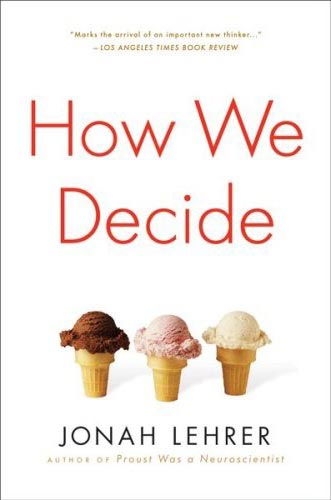Last month at a DC bookstore I saw Jonah Lehrer’s bestseller How We Decide and instantly decided to buy it. Now that’s effective marketing!
I’m an anti-bullying passionista currently up to my medulla oblongata in our new Cruel’s Not Cool! campaign. Which is why it’s no surprise that everything I hear lately passes through the “bullying” filter.
So… I’m reading a chapter in Lehrer’s book about decision making and credit card spending and I have a minor epiphany about bullying. (Stick with me for minute.)
Apparently when we buy something with cash we simultaneously feel a loss in the part of the brain associated with pain. “There goes some of my money!” Because it hurts, people who buy with cash are less likely to make those impulsive purchases which can screw you in any economy.
But brain imaging experiments indicate that buying with a credit card reduces feelings in the pain region of the brain and provides you with an instant reward (“I get what I want NOW!”). In other words, when you buy with plastic you don’t feel bad so you spend more without thinking about how you’ll pay. In 2006 Americans spent more than $17 billion in credit card penalty fees. (Ouch!)

So are you gonna play nice, or not?
Back to bullying. If you tease someone face to face and see them hurting, you (hopefully) feel some “pain” in the brain which will make you less likely to do it again. We’re not big on punishing ourselves, but we do like rewards. (More on this in a bit…)
If a bully regularly IMs or texts insulting, vile messages, then bullying, like credit card spending and drone warfare, becomes an abstract and “painless” habit so the bully will likely do it more. Especially when there’s a reward.
When it comes to sharing a “joke” with a friend (which involves teasing a third party) vs. not trash-talking… the choice to the middle school student is clear. Her #1 currency is popularity. The emotional pull toward mimicking her friend’s mean behavior is way stronger than the rational mind’s thinking “Hm, this gossiping could come back to bite me.”
The tween brain works against rational thinking when it comes to bullying and a host of other things (including getting a start on that term paper instead of letting it slide until the night before it’s due). Their developing brain matter is notoriously poor at impulse control, planning ahead and being able to predict the outcome of one’s choices.
Bottom line… being thoughtful and rational about bullying is a monumental challenge for 11-14 year olds!
In a typical middle school where bullying is rampant, what’s the reward for not engaging in malevolent behavior? What’s the reward for being a truly nice kid? Until a school comes up with the answer to that it’s not likely that kids will choose doing the right thing over being popular.
Your thoughts?













I’ve been sitting here for a minute and a half (long time for me) thinking of something witty and knowledgeable to comment, but the truth is… you speak the truth. Brilliant. I agree with your credit card analogy completely. The bully is hiding behind something, so the bullying is easier.
It’s the same with kids who pick on special needs kids. There is little to no “down side” to bullying a kid with Asperger’s Syndrome. He’s weird to them. They don’t understand how hurtful they are being.
Bullying may get you a laugh or bump up your popularity level a notch, but it causes waves far beyond that moment in time. I quit my job to home school my son because his middle school peers thought he was a juicy target. I hope the bullies got what they wanted. It was a shift of lifestyle for our family until middle school was over and my child could return to traditional school and I could go back to work.
Comment by Mary Calhoun Brown — May 14, 2010 @ 10:23 am
Annie, I can only begin to tell you how grateful I am to have come across your writing.
With all the parenting advice out there and much of my own hard-earned ‘wisdom’ at hand, I still have times when I am at a loss with my beautiful, head-strong 12-going-on-13 year old daughter, and there is something here, in the way you write and the insights you gain and share, that has already touched me from this one article. I also like how well you pulled me in from the first page into reading parenting advice that seems custom-tailored to me…I must be your target audience! 🙂
My daughter and I have always been close and although I expect that relationship to change as she grows, I certainly want it to grow and not wither, and it is difficult at times – for both of us I suspect. Thank you, in advance, for all the wisdom I am about to read and enjoy here…you are appreciated!
~ Shauna Arthurs
Comment by Shauna@BreathingProsperity.com — May 14, 2010 @ 8:05 pm
Nice job laying out the neurological underpinnings for tween decision making. My “The Story of the Three Little Girls” (http://rickackerly.com/2010/01/27/the-story-of-the-three-little-girls/) points three different ways parents can have an effect–both positive and negative.
Comment by Rick ackerly — May 15, 2010 @ 7:43 am
Rick, I was immediately drawn into your story. It shows what an effective team parents and educators can be working together for the healthy social and emotional development of kids. It also points out how, when parents have a “different” view from teachers as to what constitutes character education, then it’s less likely that their kids will make socially responsible choices.
Comment by Annie — May 15, 2010 @ 5:56 pm
As I read this post, I kept thinking “what you see is what you get”. Kids might copy these behaviors from other kids, but I have to wonder, what are they seeing at home and in school from the adults? I’m not saying that these bullies’ parents and teachers are bullies themselves (though some of them might be), but when you have adults that say and think things like: “It’s harmless”, “kids will be kids”, and “that’s what kids do”, or assume a “what can you do?” attitude, they are actually encouraging these types of behavior. As you know, I am an educator and I can’t tell you the amount of times I have witnessed adults roll their eyes and say “here we go again”. Instead of addressing the problem, it’s treated like it’s just another typical ocurrence. Do we really have to wait until it gets violent before we do something?
Perhaps if these stereotypical ideas many adults have about children are questioned by parents, administrators and educators alike, we might begin to take steps in the right direction for the sake of our kids.
That’s my two cents, Annie. Thanks for writing this!
Comment by Prisca — May 19, 2010 @ 12:49 pm
As someone once said, “If you’re not modeling what you teach (or what you say you want kids to learn) then you sure as hell are teaching something else!” Bullying is a systemic problem. Any attempt to minimize it, turn a blind eye, or infer that it’s just “kids being kids” misses the point and blows yet another opportunity to turn the ship around.
I’ve got blackberry vines taking root amongst my rose bushes. If I simply pluck a blackberry leaf here and there, it won’t stop the spread of the vines (which will totally take over if I permit it). got get in there on my hands and knees, with a shovel and dig out all the roots.
It’s the same thing with malevolent behavior amongst kids. Not only do parents and teachers have the responsibility of rooting it out whenever they see or sense it. But we, as the adults who live and work with these kids, have the moral obligation of watching our own mouths and attitudes… ALL THE TIME. Otherwise “Respect” is just a school motto and we are teaching something else.
Comment by Annie — May 19, 2010 @ 1:58 pm
This is very smart! I tell my son, with whom I share a diagnosis of ADHD, that email and the Internet are very mixed blessings for folks like us. Thanks, Annie!
Comment by katherine ellison — May 28, 2010 @ 2:17 pm
Annie, I think you are spot on. My younger son is dealing with this very situation and I plan on sharing this post with him. Thanks for your your efforts to help reduce bullying, it is truly needed and I appreciate your insight.
Comment by Suzanne Santillan — June 30, 2010 @ 7:02 am
I’m on board with the end to bullying, but I really take exception to the school of thought which constantly tells us that adolescent or teen brains are less capable of good decisions and logic. There’s plenty of studies out there which counter this assertion, so at the very least you ought to consider it controversial.
More often than not, bad decisions and poor choices are simply the result of not being taught to value respect, responsibility and long term goals over things like peer pressure and instant gratification. These things must be taught and learned, as we see many adults who still struggle with proper behavior, while plenty of young people already get it. I think adults are venturing into dangerous territory when they explain poor youthful behavior in terms of brain development. If nothing else, you’re opening the doors to removing their freedoms “for their own good” while excusing them from personal responsibility and substituting rules and laws only.
The only real way to end bullying is to make it socially unacceptable by kids themselves, and by ostracizing those who do it. And we’re making it a steeper climb toward that goal whenever we bring neurological development into the mix. Just an opinion.
Comment by Jason — September 14, 2010 @ 1:28 pm
Hi Jason,
Thanks for your comment. I’ve done quite a bit of research review in the area of teen brain development. From what I’ve read over the past 10 years, the current view does not appear to be “controversial” at all. If you’ve seen other reputable work that states otherwise, I’d be very interested in knowing about it.
You and I do agree that it’s certainly NOT the case that all teens are always “less capable of (making) good decisions and logic” but my work with teens has taught me that in times of peer pressure, stress, etc. a teen’s brain can work AGAINST their doing the right thing. For that matter, stress can easily impair an adult’s decision-making ability as well! My book, “Too Stressed to Think?” covers some of the existing thought regarding how the pre-frontal lobe (dedicated to impulse control, planning ahead and being able to reasonably predict the outcome of one’s choices) is “under construction” until we reach our mid-20’s. Another excellent book on the subject is “Yes, Your Teen is Crazy” by Michael Bradley, PhD. You might also check out Dr. Robert Sapolsky’s book, “Why Zebras Don’t Get Ulcers”.
Comment by Annie — September 14, 2010 @ 2:36 pm
Wow, never would have thought to link the two together, but it totally makes sense! Thank you for a very insightful article. P.S on PrimeTime next week there is a hidden camera show putting kids on camera with some horrible bullies (actors) to see if they speak up or shy away or follow the bully, I’m looking forward to watching the show, just saw the preview last night.
Comment by Lorrie Eubanks — February 26, 2011 @ 10:28 am